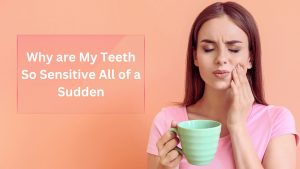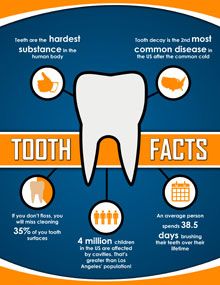
Tooth sensitivity, often described as a sudden, sharp pain that can strike like lightning, is a discomfort that many of us have encountered at some point in our lives. Whether it’s triggered by a sip of ice-cold water or a bite into a sugary treat, that jolt of pain can be quite unpleasant. In this post, we’ll look at why teeth are sensitive all of a sudden, and effective dental treatments for sensitive teeth.
Introduction to The Anatomy of a Tooth
Before we delve into the causes of tooth sensitivity, it’s essential to understand the anatomy of a tooth. A tooth is not just a solid, unfeeling structure; it’s a complex marvel composed of multiple layers. The outermost layer is enamel, which is hard and protective. Beneath the enamel lies dentin, a softer, porous layer filled with tiny nerve fibers. When dentin becomes exposed, sensitivity can occur.
The Underlying 5 Causes of Tooth Sensitivity
1. Gum Disease — A Silent Aggressor
Our mouths are bustling ecosystems of bacteria, some of which can wreak havoc if left unchecked. Gum disease, often initiated by these harmful bacteria, can lead to red, swollen gums that bleed — a condition known as gingivitis. If gum disease progresses, it can result in gum recession, exposing the sensitive dentin of the tooth.
2. Brushing Techniques — Striking a Balance
Believe it or not, your brushing technique plays a pivotal role in your oral health. Aggressive brushing, especially with abrasive toothpaste and a medium or hard toothbrush, can cause trauma to both teeth and gums. This can lead to gum recession and enamel abrasion, culprits behind tooth sensitivity.
To combat this, opt for a softer toothbrush and practice gentle, circular brushing motions. Avoid scrubbing vigorously, as this can damage your tooth’s protective layers.
3. Tooth Erosion — Slow and Steady
Tooth erosion occurs when the tooth’s structure is weakened. It can take the form of cavities, which form when acid produced by bacteria attacks and weakens the tooth. Additionally, frequent consumption of acidic foods and beverages, acid reflux, and GERD can erode tooth enamel, exposing the sensitive dentin.
To minimize the risk of erosion, limit acidic snacks and drinks, and wait at least 20–40 minutes after consuming them before brushing your teeth. This allows saliva to neutralize acid and protect your enamel.
4. Clenching and Grinding — A Hidden Menace
Teeth should only touch for about five minutes a day when swallowing. If they make prolonged contact, especially due to clenching or grinding, excessive wear can occur. This pressure can lead to gum recession and thinning of enamel, ultimately causing tooth sensitivity.
Clenching and grinding often happen unconsciously and may even occur during sleep. If you experience jaw pain, muscle tension, or headaches, it’s worth exploring this as a potential cause of tooth sensitivity. A custom night guard provided by your dentist can help protect your teeth and alleviate this issue.
5. The Passage of Time — Aging Teeth
As the years go by, your teeth naturally endure wear and tear. This can lead to the gradual thinning of enamel, which exposes the sensitive dentin beneath. While this is a natural part of aging, it can make your teeth more susceptible to sensitivity.
Navigating Tooth Sensitivity: What Can You Do?
If you’re grappling with tooth sensitivity, it’s essential to consult dental professionals who can offer tailored guidance and treatment options. Conditions causing mild sensitivity are often overlooked but addressing them promptly can prevent further discomfort.
Potential underlying issues may include cavities, deteriorating fillings, cracked or fractured teeth, or infections. Seeking professional evaluation is crucial to pinpoint the root cause of your sensitivity.
Finding Relief from Tooth Sensitivity
Are you eager to bid farewell to those sudden “zing” moments of tooth pain? Consider these options for relief:
- Over-the-Counter Sensitivity Toothpaste: Use consistently for ongoing relief.
- Over-the-Counter Fluoride Mouthwash: Provides additional fluoride protection.
- Prescription Strength Fluoride Toothpaste: Recommended for more severe cases.
- Hygienist Polish with Desensitizing Paste: A professional option for addressing sensitivity.
- Dental Office Fluoride Treatment: Available for comprehensive relief.
- In-Office Desensitizer for Exposed Root Surfaces: Targeted treatment for exposed roots.
- Custom Take-Home Trays for Desensitizing Teeth: Convenient at-home treatment.
- Custom Night Guard or Hard Splint for Clenching and Grinding: Protects teeth and relaxes muscles.
- Specialist Consultation: Seek additional help from specialists for personalized care.
This guide provides an overview of the most common types of tooth sensitivity, their causes, and potential treatments. However, for precise and effective solutions, consult with dental professional. Understanding the underlying cause of your discomfort is essential for tailored treatment and lasting relief.
In conclusion, While tooth sensitivity can be disruptive, but, it’s a manageable condition with the right approach and professional guidance. Prioritize your oral health, and don’t hesitate to reach out to an experienced dentist

 Welcome Video
Welcome Video Our Testimonials
Our Testimonials
 Tooth Facts
Tooth Facts